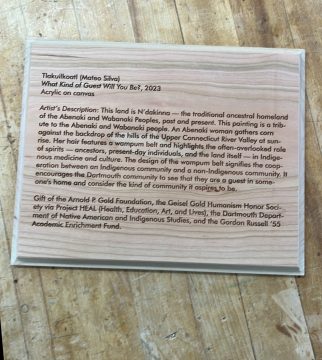On Tuesday, Nov. 14, Project HEAL, part of Geisel School of Medicine’s chapter of the Gold Humanism Honor Society (GHHS), unveiled a new work of art honoring the Abenaki people of the Upper Valley.
Welcoming everyone to this special community celebration, Geisel Dean Duane Compton, PhD, acknowledged the importance of the artwork in recognizing the Abenaki and Wabanaki, and thanked GHHS for their commitment to Project HEAL, Amal Cheema’24 and Arvind Suresh MED’23 for their leadership of this project, as well as Shawn O’Leary and members of the Abenaki Elder’s Council in attendance.
Before introducing the artist—Mateo Tlakuilkoatl Silva ’26, a Dartmouth undergraduate—Cheema expressed deep gratitude to those in attendance and explained that Project HEAL, health, education, art, and lives, was founded to promote anti-racism and critical self-reflection in both the Upper Valley and medical school through art, education, and advocacy.
Photos by Rob Strong
Last year, “when considering what artwork could spur critical self-reflection, our group readily identified the need for a sustained acknowledgment of Native and Indigenous peoples, including the Abenaki and Wabanaki,” Cheema said.
“It is my hope that Geisel students will look upon this painting and be reminded of how they could use the privilege of their education and social position to advocate for greater representation, learn with Native communities, address health inequities and disparities in both care and system, and practice medicine compassionately in respect for history, culture, and heritage.”
Prior to unveiling his artwork, Silva talked about his open relationship with Abenaki elders—seeking their guidance while ensuring respect for all those involved throughout the creative process. He thanked everyone for attending the unveiling celebration, for inviting him to be part of their story, and hopes it will inspire people to reflect on how they live their lives.
“This artwork portrays the Abenaki as a vibrant, contemporary community with enduring values and traditions,” Silva said. He also hopes the painting encourages introspection about the kind of community Geisel aspires to be. “Geisel's focus on medical education aligns with the healing aspects of Indigenous culture and offers an opportunity for the school to lead in bridging Western and Indigenous medical knowledge,” he said.

He also acknowledged not everyone will like the painting. “I hope this makes people think about how to live their lives, how to be stewards of this land, and how this land is taking care of us, which Indigenous people learn from birth. For Indigenous people medicine is community, music, art, family, and respect,” Silva said.
O’Leary, director of diversity, inclusive, and community engagement, said it was an honor and pleasure to work with Silva and appreciated his thoughtful approached to the artwork, which he described as powerful.
The artwork now hangs in Remsen 3 for all to see. Next to the work is a wooden plaque made by Cheema in Dartmouth’s woodworking shop.